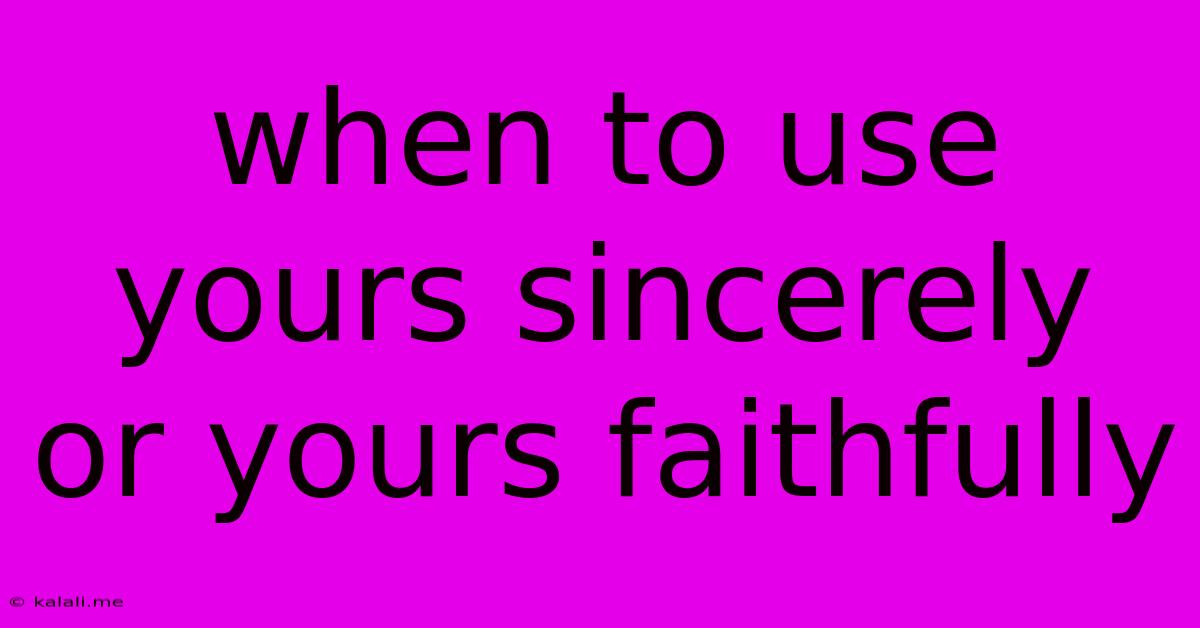When To Use Yours Sincerely Or Yours Faithfully
Kalali
May 19, 2025 · 3 min read

Table of Contents
When to Use "Yours Sincerely" vs. "Yours Faithfully": A Definitive Guide
Choosing between "Yours sincerely" and "Yours faithfully" in your closing can feel like navigating a minefield of etiquette. This seemingly small detail can subtly impact the overall tone and professionalism of your letter or email. This guide will clarify when to use each, ensuring your correspondence always hits the right note. Understanding the nuances will boost your professional image and help avoid any unintended misunderstandings.
Understanding the Difference: Formality and Familiarity
The choice between "Yours sincerely" and "Yours faithfully" hinges primarily on your relationship with the recipient and the level of formality required. It's all about conveying the right level of respect and professionalism.
-
Yours sincerely: This closing is used when you know the recipient's name and have addressed them personally (e.g., "Dear Mr. Smith," "Dear Sarah"). It signifies a warmer, more personal tone, suggesting a degree of familiarity or established relationship.
-
Yours faithfully: This is reserved for situations where you don't know the recipient's name and have used a more formal salutation (e.g., "Dear Sir/Madam," "To Whom It May Concern"). It maintains a greater distance and emphasizes formality and respect.
When to Use "Yours Sincerely"
Use "Yours sincerely" when:
- You know the recipient's name: This is the most important factor. If you've addressed the letter with their name, "Yours sincerely" is the appropriate closing.
- You have a pre-existing relationship with the recipient: For example, if you're writing to a colleague, client you've worked with before, or a friend.
- The communication is relatively informal (within professional boundaries): This could include emails to colleagues or less formal business letters.
- You're writing a thank-you note: A personal touch is always appreciated in thank you notes.
When to Use "Yours Faithfully"
Use "Yours faithfully" when:
- You don't know the recipient's name: This is the key differentiator. If you've used a general salutation like "Dear Sir/Madam," then "Yours faithfully" is the correct choice.
- You are writing to a high-ranking official or someone you've never met: Maintaining formality is crucial in these situations.
- The communication is highly formal: This includes formal business letters, official complaints, or applications.
- You are unsure of the recipient's preferred mode of address: When in doubt, err on the side of caution and choose "Yours faithfully."
Modern Considerations & Email Etiquette
While these guidelines are generally accepted, modern communication practices sometimes blur the lines. Email etiquette often leans towards slightly less formality, but the principle remains: addressing someone by name warrants "Yours sincerely," while a more general address necessitates "Yours faithfully." However, in today's digital age, a simple "Regards" or "Kind regards" is also widely acceptable across various levels of formality. Choose the closing that best reflects the tone and context of your communication.
Examples:
- Yours sincerely: "Dear Mr. Jones, ... Yours sincerely, [Your Name]"
- Yours faithfully: "Dear Sir/Madam, ... Yours faithfully, [Your Name]"
By understanding these simple yet crucial distinctions, you can ensure your correspondence maintains the appropriate level of professionalism and leaves a positive lasting impression. Remember, the closing is the final touch, and it should reflect the overall tone of your communication.
Latest Posts
Latest Posts
-
How Long Can A Thermos Keep Water Hot
May 20, 2025
-
How To Drain The Water From A Toilet
May 20, 2025
-
How To Get Oil Out Of Wood
May 20, 2025
-
What Does It Mean To Air Someone
May 20, 2025
-
I Know That I Do Not Know
May 20, 2025
Related Post
Thank you for visiting our website which covers about When To Use Yours Sincerely Or Yours Faithfully . We hope the information provided has been useful to you. Feel free to contact us if you have any questions or need further assistance. See you next time and don't miss to bookmark.